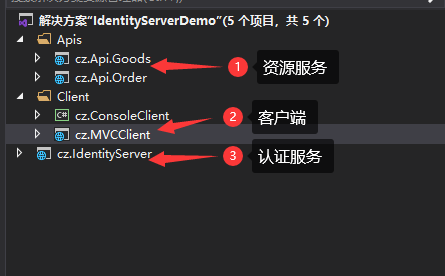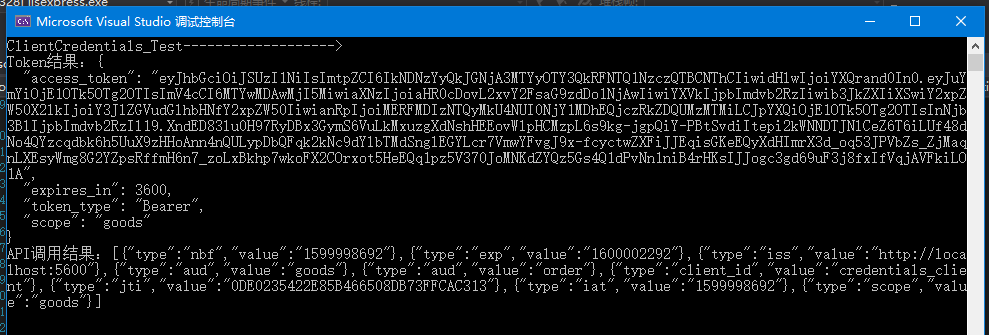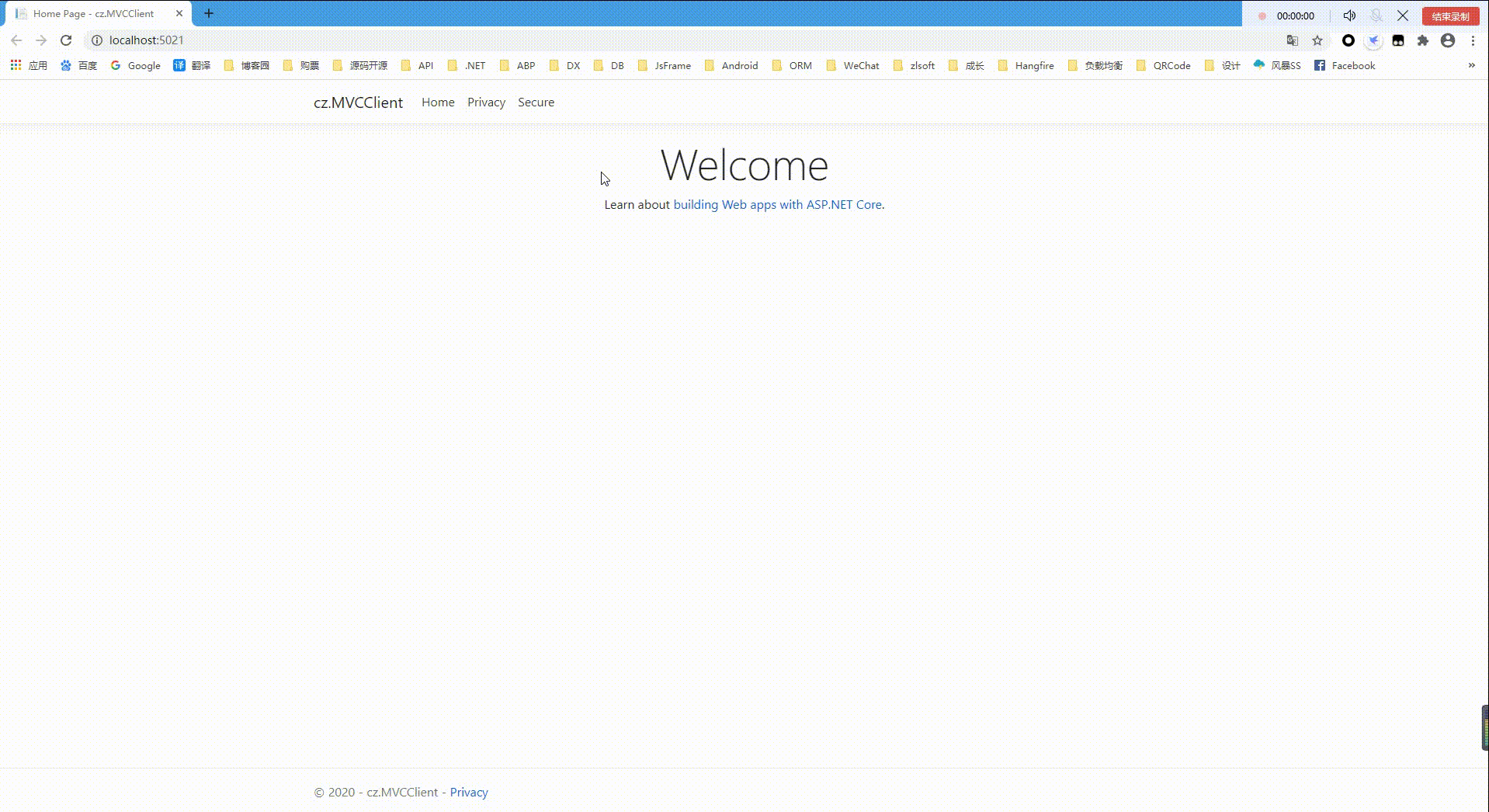认证授权:IdentityServer4 - 各种授权模式应用
前言:
前面介绍了IdentityServer4 的简单应用,本篇将继续讲解IdentityServer4 的各种授权模式使用示例
授权模式:
环境准备
a)调整项目结构如下:

b)调整cz.IdentityServer项目中Statup文件如下
public class Startup { public void ConfigureServices(IServiceCollection services) { services.AddControllersWithViews(); services.Configure<CookiePolicyOptions>(options => { options.MinimumSameSitePolicy = SameSiteMode.Strict; }); services.AddIdentityServer() .AddDeveloperSigningCredential() //api资源 .AddInMemoryApiResources(InMemoryConfig.GetApiResources()) //4.0版本需要添加,不然调用时提示invalid_scope错误 .AddInMemoryApiScopes(InMemoryConfig.GetApiScopes()) .AddTestUsers(InMemoryConfig.Users().ToList()) .AddInMemoryIdentityResources(InMemoryConfig.GetIdentityResourceResources()) .AddInMemoryClients(InMemoryConfig.GetClients()); } // This method gets called by the runtime. Use this method to configure the HTTP request pipeline. public void Configure(IApplicationBuilder app, IWebHostEnvironment env) { if (env.IsDevelopment()) { app.UseDeveloperExceptionPage(); } app.UseRouting(); app.UseStaticFiles(); app.UseCookiePolicy(); app.UseIdentityServer(); app.UseAuthentication(); //使用默认UI,必须添加 app.UseAuthorization(); app.UseEndpoints(endpoints => { endpoints.MapControllerRoute(name: "default", pattern: "{controller=Home}/{action=Index}/{id?}"); }); }
}
c)在cz.Api.Order项目中添加控制器:IdentityController
namespace cz.Api.Order.Controllers { [Route("identity")] [ApiController] [Authorize] public class IdentityController : ControllerBase { [HttpGet] public IActionResult Get() { return new JsonResult(from c in User.Claims select new { c.Type, c.Value }); } } }
1、客户端模式
a)在InMemoryConfig中GetClients方法中添加客户端:
new Client { ClientId = "credentials_client", //访问客户端Id,必须唯一 ClientName = "ClientCredentials Client", //使用客户端授权模式,客户端只需要clientid和secrets就可以访问对应的api资源。 AllowedGrantTypes = GrantTypes.ClientCredentials, ClientSecrets = { new Secret("secret".Sha256()) }, AllowedScopes = { IdentityServerConstants.StandardScopes.OpenId, IdentityServerConstants.StandardScopes.Profile, "goods" }, },
b)在cz.ConsoleClient项目中安装Nuget包:IdentityModel,在Program中添加如下方法:
/// <summary> /// 客户端认证模式 /// </summary> private static void ClientCredentials_Test() { Console.WriteLine("ClientCredentials_Test------------------->"); var client = new HttpClient(); var disco = client.GetDiscoveryDocumentAsync("http://localhost:5600/").Result; if (disco.IsError) { Console.WriteLine(disco.Error); return; } //请求token var tokenResponse = client.RequestClientCredentialsTokenAsync(new ClientCredentialsTokenRequest { Address = disco.TokenEndpoint, ClientId = "credentials_client", ClientSecret = "secret", Scope = "goods" }).Result; if (tokenResponse.IsError) { Console.WriteLine(tokenResponse.Error); return; } Console.WriteLine(tokenResponse.Json); //调用认证api var apiClient = new HttpClient(); apiClient.SetBearerToken(tokenResponse.AccessToken); var response = apiClient.GetAsync("http://localhost:5601/identity").Result; if (!response.IsSuccessStatusCode) { Console.WriteLine(response.StatusCode); } else { var content = response.Content.ReadAsStringAsync().Result; Console.WriteLine(content); } }
运行该程序结果如下:

2、密码模式
a)在InMemoryConfig中GetClients方法中添加客户端:
new Client { ClientId = "password_client", ClientName = "Password Client", ClientSecrets = new [] { new Secret("secret".Sha256()) }, //这里使用的是通过用户名密码换取token的方式. AllowedGrantTypes = GrantTypes.ResourceOwnerPassword, AllowedScopes = { IdentityServerConstants.StandardScopes.OpenId, IdentityServerConstants.StandardScopes.Profile, "order","goods", } },
b)cz.ConsoleClient项目,继续在Program中添加如下方法:
/// <summary> /// 用户名密码模式 /// </summary> public static void ResourceOwnerPassword_Test() { Console.WriteLine("ResourceOwnerPassword_Test------------------->"); // request token var client = new HttpClient(); var disco = client.GetDiscoveryDocumentAsync("http://localhost:5600/").Result; var tokenResponse = client.RequestPasswordTokenAsync(new PasswordTokenRequest() { Address = disco.TokenEndpoint, ClientId = "password_client", ClientSecret = "secret", UserName = "cba", Password = "cba", Scope = "order goods", }).Result; if (tokenResponse.IsError) { Console.WriteLine(tokenResponse.Error); return; } Console.WriteLine(tokenResponse.Json); // call api var apiClient = new HttpClient(); client.SetBearerToken(tokenResponse.AccessToken); var response = apiClient.GetAsync("http://localhost:5601/identity").Result; if (!response.IsSuccessStatusCode) { Console.WriteLine(response.StatusCode); } else { var content = response.Content.ReadAsStringAsync().Result; Console.WriteLine(content); } }
运行该程序结果同上:
3、简化模式
a)在InMemoryConfig中GetClients方法中添加客户端:
new Client { ClientId = "implicit_client", ClientName = "Implicit Client", ClientSecrets = new [] { new Secret("secret".Sha256()) }, AllowedGrantTypes = GrantTypes.Implicit, AllowedScopes = { "order","goods", IdentityServerConstants.StandardScopes.OpenId, IdentityServerConstants.StandardScopes.Profile }, RedirectUris = { "http://localhost:5021/signin-oidc" }, PostLogoutRedirectUris = { "http://localhost:5021" }, //是否显示授权提示界面 RequireConsent = true, },
b)调整在cz.MVCClient中Statup文件中内容如下:
public class Startup { public Startup(IConfiguration configuration) { Configuration = configuration; } public IConfiguration Configuration { get; } // This method gets called by the runtime. Use this method to add services to the container. public void ConfigureServices(IServiceCollection services) { services.Configure<CookiePolicyOptions>(options => { // This lambda determines whether user consent for non-essential cookies is needed for a given request. options.CheckConsentNeeded = context => true; options.MinimumSameSitePolicy = SameSiteMode.Lax; }); JwtSecurityTokenHandler.DefaultMapInboundClaims = false; services.AddControllersWithViews(); services.AddAuthentication(options => { options.DefaultScheme = "Cookies"; options.DefaultChallengeScheme = "oidc"; }) .AddCookie("Cookies") .AddOpenIdConnect("oidc", options => { options.RequireHttpsMetadata = false; options.Authority = "http://localhost:5600"; options.ClientId = "implicit_client"; options.ClientSecret = "secret"; }); } // This method gets called by the runtime. Use this method to configure the HTTP request pipeline. public void Configure(IApplicationBuilder app, IWebHostEnvironment env) { if (env.IsDevelopment()) { app.UseDeveloperExceptionPage(); } else { app.UseExceptionHandler("/Home/Error"); } app.UseStaticFiles(); app.UseCookiePolicy(); app.UseRouting(); app.UseAuthentication(); app.UseAuthorization(); app.UseEndpoints(endpoints => { endpoints.MapControllerRoute( name: "default", pattern: "{controller=Home}/{action=Index}/{id?}"); }); } }
c)在cz.MVCClient中添加Nuget包:IdentityServer4.AccessTokenValidation、Microsoft.AspNetCore.Authentication.OpenIdConnect;在HomeController中添加方法:
[Authorize]
public IActionResult Secure()
{
ViewData["Message"] = "Secure page.";
return View();
}
//注销
public IActionResult Logout()
{
return SignOut("oidc", "Cookies");
}
d)界面调整:
在_Layout.cshtml文件中添加导航按钮:Secure、Logout
<li class="nav-item">
<a class="nav-link text-dark" asp-area="" asp-controller="Home" asp-action="Secure">Secure</a>
</li>
@if (User.Identity.IsAuthenticated)
{
<li class="nav-item">
<a class="nav-link text-dark" asp-area="" asp-controller="Home" asp-action="Logout">Logout</a>
</li>
}
添加视图:Secure.cshtml文件:
@{
ViewData["Title"] = "Secure";
}
<h2>@ViewData["Title"]</h2>
<h3>User claims</h3>
<dl>
@foreach (var claim in User.Claims)
{
<dt>@claim.Type</dt>
<dd>@claim.Value</dd>
}
</dl>
e)运行结果如下:

简化模式还支持在Js客户端中运行可以查看官方说明文档:https://identityserver4.readthedocs.io/en/latest/quickstarts/4_javascript_client.html
4、授权码模式
a)在InMemoryConfig中GetClients方法中添加客户端:
new Client { ClientId = "code_client", ClientName = "Code Client", ClientSecrets = new [] { new Secret("secret".Sha256()) }, AllowedGrantTypes = GrantTypes.Code, RedirectUris = { "http://localhost:5021/signin-oidc" }, PostLogoutRedirectUris = { "http://localhost:5021/signout-callback-oidc" },
//是否显示授权提示界面 RequireConsent= true, AllowedScopes = { "order","goods", IdentityServerConstants.StandardScopes.OpenId, IdentityServerConstants.StandardScopes.Profile } },
b)调整在cz.MVCClient中Statup文件中ConfigureServices方法内容如下:
// This method gets called by the runtime. Use this method to add services to the container. public void ConfigureServices(IServiceCollection services) { services.Configure<CookiePolicyOptions>(options => { // This lambda determines whether user consent for non-essential cookies is needed for a given request. options.CheckConsentNeeded = context => true; options.MinimumSameSitePolicy = SameSiteMode.Lax; }); JwtSecurityTokenHandler.DefaultMapInboundClaims = false; services.AddControllersWithViews(); services.AddAuthentication(options => { options.DefaultScheme = "Cookies"; options.DefaultChallengeScheme = "oidc"; }) .AddCookie("Cookies") .AddOpenIdConnect("oidc", options => { options.RequireHttpsMetadata = false; options.Authority = "http://localhost:5600"; options.ClientId = "code_client"; options.ClientSecret = "secret"; options.ResponseType = "code"; options.SaveTokens = true; options.Scope.Add("order"); options.Scope.Add("goods"); options.GetClaimsFromUserInfoEndpoint = true; }); }
c)运行结果如下:同简化模式运行效果相同
5、混合模式(Hybrid)
a)在InMemoryConfig中GetClients方法中添加客户端:
new Client { ClientId = "hybrid_client", ClientName = "Hybrid Client", ClientSecrets = new [] { new Secret("secret".Sha256()) }, AllowedGrantTypes = GrantTypes.Hybrid, //是否显示授权提示界面 RequireConsent = true, AllowedScopes = { "order","goods", IdentityServerConstants.StandardScopes.OpenId, IdentityServerConstants.StandardScopes.Profile } }
b)调整在cz.MVCClient中Statup文件中ConfigureServices方法内容如下:
public void ConfigureServices(IServiceCollection services) { services.Configure<CookiePolicyOptions>(options => { // This lambda determines whether user consent for non-essential cookies is needed for a given request. options.CheckConsentNeeded = context => true; options.MinimumSameSitePolicy = SameSiteMode.Lax; }); JwtSecurityTokenHandler.DefaultMapInboundClaims = false; services.AddControllersWithViews(); services.AddAuthentication(options => { options.DefaultScheme = "Cookies"; options.DefaultChallengeScheme = "oidc"; }) .AddCookie("Cookies") .AddOpenIdConnect("oidc", options => { options.RequireHttpsMetadata = false; options.Authority = "http://localhost:5600"; options.ClientId = "hybrid_client"; options.ClientSecret = "secret"; options.ResponseType = "code token id_token"; options.SaveTokens = true; options.ResponseMode = "fragment"; options.GetClaimsFromUserInfoEndpoint = true; options.Scope.Add("order"); options.Scope.Add("goods"); }); }
总结:
应用场景总结
- 客户端模式(Client Credentials):和用户无关,应用于应用程序与 API 资源之间的交互场景。
- 密码模式:和用户有关,常用于第三方登录。
- 简化模式:可用于前端或无线端。
- 混合模式:推荐使用,包含 OpenID 认证服务和 OAuth 授权,针对的是后端服务调用。
过程中遇到的坑:
- Postman调用时总是提示:invalid_scope异常;
解决:在添加IdentityServer服务时:调用AddInMemoryApiScopes方法注册Scope
- MVC项目登录成功后跳转时,找不到http://localhost:5020/signin-oidc路径:
解决:在Statup文件中添加services.Configure<CookiePolicyOptions>(options =>{options.CheckConsentNeeded = context => true;options.MinimumSameSitePolicy = SameSiteMode.Lax; });
- 登录时授权界面展示展示:
解决:客户端注册时,指定属性RequireConsent= true
Git地址:https://github.com/cwsheng/IdentityServer.Demo.git



